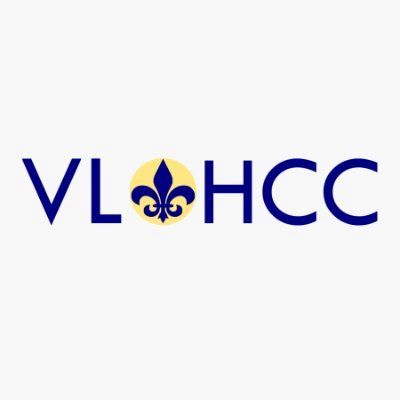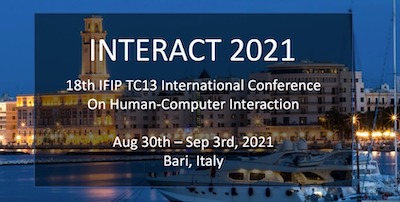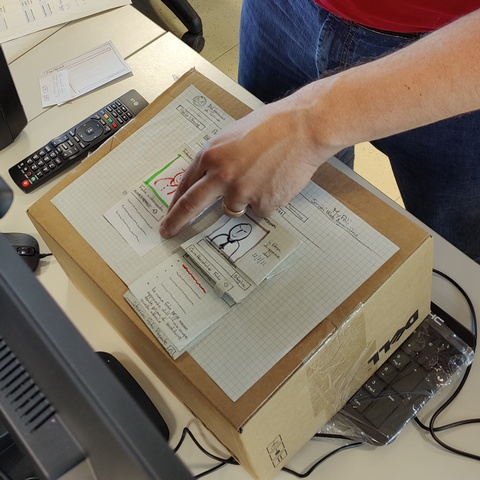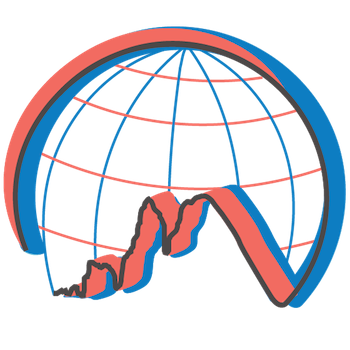- Details
The e-Lite group will participate at the IEEE Symposium on Visual Languages and Human-Centric Computing (VL/HCC) with a short research paper entitled "TextCode: A Tool to Support Problem Solving Among Novice Programmers." VL/HCC 2021 will be held virtually due to Covid-19 from 10-13 October 2021.
In this paper, TextCode is presented; an IDE specifically designed to support problem solving among novice programmers in an introductory university course. In TextCode, the graphical interface arrangement and the interaction design encourage the developers to follow a set of steps to reach the final solution. Namely, these steps refer to reading and understanding the programming problem statement before start coding, decomposing it down into subproblems, exploring alternative implementations for each subproblem, and arranging these implementations to build a general solution. We consider that providing a tool whose design emphasizes the problem-solving steps can raise metacognitive awareness among novices and help them implement a working solution.
Juan Pablo Sáenz will present the work on Wednesday, October 13, from 13:40 to 13:50 (Central Time [US & Canada]).
The presentation video can be found here.
- Details
The e-Lite group will participate at the 18th International Conference on Human–Computer Interaction (INTERACT 2021). The conference will be held in Bari, Italy, in an hybrid format from August 30 to September 3, 2021.
Luigi and Alberto will be at the conference. Luigi will join the EMPATHY workshop on Monday, August 30, where he will present a paper on the vocal composition of trigger-action rules in the smart home. In particular, the paper describes a study aimed at understanding whether and how end users would converse with a conversational assistant to personalize their domestic Internet-of-Things ecosystem. The underlying hypothesis is that users are willing to create personalization rules vocally and that conversational assistants could facilitate the composition process, given their knowledge of the IoT ecosystem. The preliminary study was conducted as a semi-structured interview with 7 non-programmers and provided some evidence in support of this hypothesis. This work is part of the research activities on End-User Development in the IoT.
Alberto, instead, will present a paper entitled "Towards Multi-Device Digital Self-Control Tools" on Wednesday, September 1 during the "Interaction modalities and techniques 1" session (11:15-12:30 CEST). The paper introduces FeelHabits, a DSCT that allows users to set up, through a novel approach, multi-device intentions, i.e., contextual time and launch limits for the simultaneous and/or alternating use of the PC and the smartphone. A preliminary study on 7 participants suggests that FeelHabits might be effective for reducing some multi-device behaviors, and opens the way for further research.
- Details
L'Area Information Technology del Politecnico di Torino gestisce centinaia di procedure applicative web-based, realizzate nel corso dei decenni, ed aventi diversi livelli di usabilità. Nel periodo giugno-luglio 2021, è stato organizzato un corso di aggiornamento professionale, rivolto al personale tecnico dell'Area IT dell'ateneo, sull'introduzione alla Usabilità delle interfacce web, particolarmente mirato agli accorgimenti pratici per attuare una rapida progettazione e valutazione dell'usabilità delle diverse applicazioni interne sviluppate ed in fase di sviluppo.
- Details
Gli smartphone sono diventati parte integrante della nostra vita quotidiana e il loro utilizzo è così cresciuto che non possiamo uscire di casa senza di loro. Grazie a essi, possiamo leggere le notizie mentre scriviamo a un amico su WhatsApp, possiamo vedere film, controllare le nostre e-mail e navigare sui social per passare il tempo. Nonostante i molti vantaggi e le opportunità che tali disposibiti possono fornire per un "supporto sociale", gli ultimi anni hanno visto un'attenzione crescente sugli aspetti negativi legati all'abuso del loro utilizzo.
Questo è il punto di partenza e la premessa di un nuovo corso offerto a tutti gli studenti al secondo anno delle lauree in Ingegneria. Il corso fa parte della rosa dei corsi a scelta (per la precisione, dei crediti liberi del catalogo di Ateneo Grandi Sfide Globali) dall'anno accademico 2021/2022.
- Details
In this week, the e-Lite group participated in the training (theoretical and practical il lab) with 13 novice programmers, in the context of a post-degree master. The students worked together, in groups, to develop simple "full stack" IoT sistems, and to test new approaches to IoT programming, such as Computational Notebooks.
The official tweet shows Fulvio Corno and Juan Pablo Sáenz during the last class of the course.
Continua il percorso dei 12 colleghi che frequentano il Master in Smart Product Design 4.0, inaugurato da #Olivetti con @PoliTOnews 🚀
— Olivetti (@OlivettiOnline) July 16, 2021
Eccoli alla sede di @ConfindCanavese di #Ivrea durante il laboratorio sulla sensoristica #IoT di ultima generazione 💡👩🏻💻#DesignMeetsTechnology pic.twitter.com/qXH7rD18jB
- Details
The e-Lite group will participate at CHItaly 2021, the 14th Edition of the Biannual Conference of the Italian SIGCHI Chapter. The conference will be held in an hybrid setting, both in Bolzano and online, on 11-13 July 2021. The theme of the conference, as defined in summer 2019, is "Frontiers of HCI".
Luigi, who is in the organizing commitee of the conference as proceedings co-chair, will be a panelist of the "Collective reflection on the past and futures of CHItaly".
The panel will be held on the last conference day at 6:00 PM. Its aim is to provoke reflections on the past and the future of human-centred research in computing, also in view of the new hybrid dissemination context we all have experienced in the last year. This will be discussed from multiple perspectives, given that each panelist comes from different disciplines and is at different stages of their research career.
In addition to this, Luigi will also join the SIGCHI Italy townhall meeting, on Monday evening.
More information on the conference website: https://chitaly2021.inf.unibz.it






